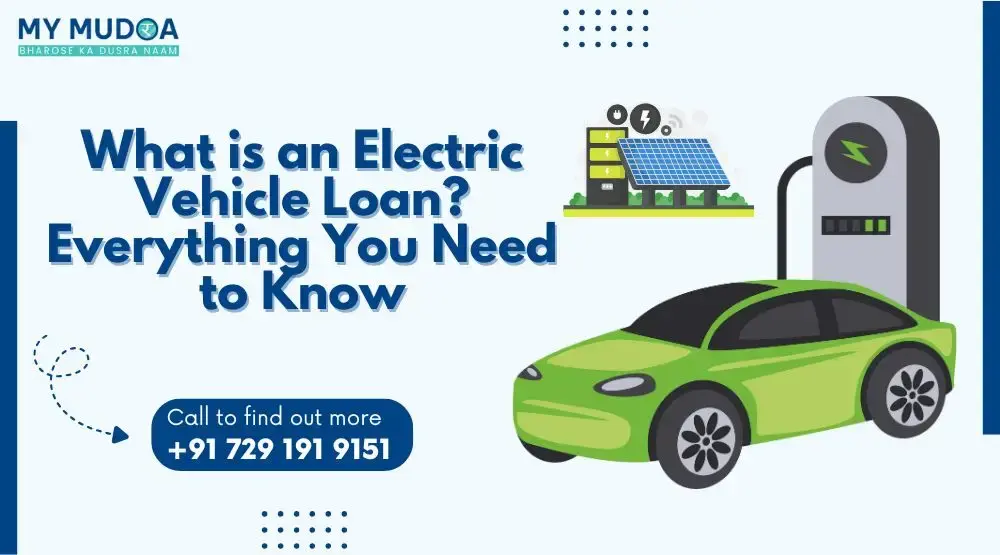
"Curious about electric vehicle loans? Check out our blog to understand what an Electric Vehicle Loan (Green Car Loan) is, its key benefits, and how you can finance your eco-friendly vehicle."

Published: 3 July 2025
Updated: 3 July 2025
Are you among the many Indians who are planning to switch to an electric vehicle (EV)? With EV sales in India breaking all records and the government offering incentives, many are looking at the change. But let's face it — electric two-wheelers and four-wheelers aren't inexpensive. That's where an electric vehicle loan or green car loan comes into the picture.
Here in this blog, we'll tell you all you need to know about electric vehicle loans, how they work, their advantages, how to apply, tax benefits, and the answers to all your burning issues.
An electric vehicle loan (EV loan) is a type of specialized loan for the purchase of electric cars, scooters, or bicycles. It is like a green car loan to finance zero- or low-emission vehicles. EV loans differ from standard auto loans since they usually have lower rates of interest, longer loan periods, more favourable terms, and special benefits, all making them a good option for environmentally friendly buyers.
Let's be real. Electric cars are more expensive upfront than their diesel or petrol relatives. The good news? EV financing plans are set up to help you cover that extra cost. Here's how an EV loan makes financial sense:
Let’s us take a quick look at the current interest rates (as of June 2025):
|
Bank/Institution |
EV Loan Rate |
Regular Car Loan Rate |
|
Indian Overseas Bank |
8.15% |
8.35% |
|
Union Bank |
8.20% |
8.30% |
|
PNB |
8.35% |
8.40% |
|
Central Bank of India |
8.35% |
8.35% |
|
Canara Bank |
8.55% |
8.65% |
|
Indian Bank |
8.70% |
8.75% |
For electric vehicles and SUVs, the interest rates are usually between 8.5% and 9.5%. Electric two-wheelers can carry higher interest rates, between 18% and 22%.
Here's a true incentive: According to the Income Tax Act, Section 80EEB, you can avail a tax deduction of up to ₹1.5 lakh annually on the interest on your EV loan. This is applicable to loans sanctioned from April 1, 2019, to March 31, 2023, and stays valid as long as your loan is ongoing.
Fast facts:
Getting an EV car loan is simpler than you imagine. Here is what you need to have:
EV loans are simple and user-friendly. Here’s how the process usually goes:
1. You pick the EV of your choice. It can be your dream electric car, bike, or scooter.
2. You then apply for an EV loan by submitting your electric vehicle application online or offline.
3. Lenders then check your eligibility, credit score, documents, and other details and then verify your application.
4. Once approved, the loan amount is paid directly to the dealer. You drive away in your new EV.
5. You pay the loan back in simple monthly installments over your chosen tenure.
Let’s say you want to buy an electric car worth ₹12 lakh.
Your EMI would be roughly ₹20,500 a month. In five years, you'd pay approximately ₹2.3 lakh in interest. But with Section 80EEB, you can deduct up to ₹1.5 lakh annually as a tax deduction from that interest — making your EV even cheaper.
EV loans are not limited to cars. You can borrow for:
Electric vehicles are going to define the mobility landscape of India. With government support, lower operating costs, and increased green concern, people are increasingly looking to transition to EVs. Though EV finance and green car loans are bringing the price within reach, there's a responsibility to look around and compare offers, verify whether you qualify for an electric vehicle loan, and know the tax advantages prior to applying. Don't rush, be sure to look over your choices, and select the EV finance option that works best for you and your budget. The future of cleaner, greener travel awaits and with the proper facts, you can feel secure in your choice.
Also Read:
- Why an EV Loan is the Future of Smart Borrowing
- How Green Finance Can Be a Sustainable Choice for Your Home
Ans: An electric vehicle loan (EV loan) is a type of loan made for buying electric cars or electric two-wheelers. It generally has low interest rates and longer tenure than standard car loans.
Ans: Interest rates for Indian EV loans start around 8.15% onwards p.a. and range between 8.5% to 9.5% for electric cars, and 18% to 22% for electric two-wheelers.
Ans: Yes. You can claim up to ₹1.5 lakh per year on the interest paid for your EV loan under Section 80EEB if the loan is taken from a reputed bank.
Ans: You will require ID proof, address proof, income proof, and vehicle information. A high credit score is preferable.
Ans: Repayment tenure can go up to 84 months (7 years), depending on the lender.
Ans: Some lenders enable you to factor in the installation costs of a home charging station when taking out an EV loan.
Ans: A green car loan is a term used to refer to an EV loan, intended for environmentally friendly cars such as electric or hybrid vehicles.
💬 Comments
Leave a comment or ask a question!
Please Enter Your Name
Please Enter Your Email
Please Enter Your Phone
Please Write Your Comment